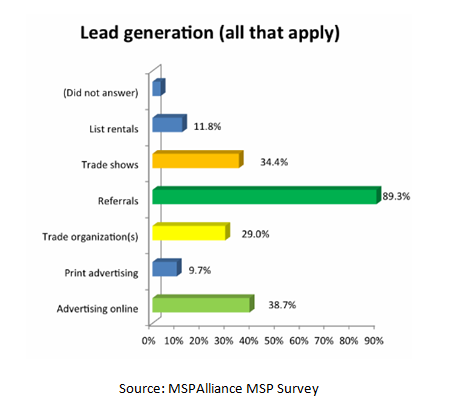Marketing Managed Services via Referrals
Beefing up and formalizing the referral process is key to MSPs' growth.
April 7, 2015

By Kaseya Guest Blog 1
In his keynote speech at MSPWorld last week, Charles Weaver, CEO of MSPAlliance, talked about the importance of MSPs improving their marketing capabilities. While MSPs are expert at servicing their clients’ IT needs, most will admit that marketing is not their strong suit. Word of mouth, or referrals, is the preferred strategy. Charles urged the MSPs in his audience to, at a minimum, beef up their referral programs

The big challenge is that finding and attracting prospective clients is expensive. For MSPs, particularly those who were previously VARs and channel partners, the task of creating and executing an independent marketing strategy can be quite daunting. Nevertheless, it is becoming ever more necessary. For VARs, the primary focus is reselling vendors’ technologies. You could leverage vendors’ content, collateral, programs, brand and MDF funds. But, as an MSP, you are (hopefully) marketing your unique service offerings and technical capabilities.
Yes, you do use PCs, routers, switches and other hardware, as well as tools such as PSA and RMM (remote monitoring and management) software, but these are all primarily for your internal use. Your software tools are only partially exposed–for example, via reports to your clients. Indeed, many MSPs brand reports with their own logos to promote their businesses and avoid highlighting that their tools are from third parties (and could be purchased directly). Consequently, vendors’ marketing materials and programs offer little value in helping you generate managed services demand. You must create your own.

Referrals from customer advocates are an attractive option. Not only are leads from referrals/customer advocacy much more likely to convert to sales (as both prospect and referrer will have discussed your suitability already), they are also less expensive to generate than many other types of leads. Notice I said “less expensive,” not “free.” Some leads will come to you without any cost attached, but if you want to drive the growth of your business, you’ll want to invest in a solid referral program rather than just wait for the occasional recommendation.
Here are six keys to making your referral program a great success:
Timing: Invest in an ongoing program that rewards your existing customers for their advocacy in making referrals and provides incentive for those with great connections to refer you multiple times. Don’t wait until the last month of the quarter, when sales have been slow, to rush out a one-off request for your clients’ help. Rather than improving your existing relationships, this could have the opposite effect.
Plan to deliver value: Just as you deliver value in your managed services, you should plan to deliver value through your referral program. Can you offer access to premium information–for example, industry reports that you can share or your own “first view” technology news interpretations? What does it mean for your customer? You might offer an additional level of managed service support or device coverage. Offering access to your senior management or help with your clients’ marketing activities might also be of value. Or just buy season tickets to a favorite local sports program and provide free tickets. Whatever you do, make sure you formalize it into a well-defined program so that the program can easily be “sold”.
Recognize those who help: Recognizing those who help via a customer newsletter or at customer events spreads the word about your advocacy program and lets your other customers know about the benefits. You can describe the perks your referrers have received and thank them publicly at the same time. This legitimizes your advocacy program and avoids the perception of it as a “back room” activity.
Ask: With a strong program in place, it becomes very easy to ask for your customers’ help. “Would you be interested in joining our advocacy program? Here are the benefits.” This sounds much better than asking if they could help you out by recommending you to one of their contacts. It can even become a selling point for your services: “As well as our managed services offerings, we have an excellent referral program you might like to take advantage of … ”
Make it formal: To be of most value, your customers must be able to check the status of their referrals and rewards–without having to ask to do so. Did you convert the lead they gave you? What are they getting in return? In addition, by managing and measuring your program you can determine the effectiveness of the rewards you offer and tune them to improve the efficacy of the program. Plus, you’ll start to see predictable results and be able to count on the program to contribute the leads you need.
Make it fun: Remember that while business incentives can be extremely valuable, making a referral ultimately requires someone to take a personal risk. They are recommending you and your services to someone they know. Make sure there are benefits in the form of fun activities as well as personal rewards.
Referrals can be a great source of leads, but, as with most other forms of marketing, what you get out of a program will depend a lot on what you invest. Good luck with your program.
 Ray Wright of is a member of the Product Marketing team at Kaseya. He is a high-tech industry and marketing expert with over 25 years’ experience marketing to and through MSPs and resellers. His product responsibilities have included both network- and system-management solutions; security solutions; tethered, wireless and mobile solutions; and software, hardware and services. His background includes senior marketing roles at Motorola, Cabletron and CA, where he focused on the needs of the IT functions at enterprises and SMBs in a wide variety of industry segments. Ray‘s current responsibility is to help Kaseya’s MSP and mid-sized enterprise customers be successful. He was a speaker at MSPWorld Spring 2015 and delivered the session “Strategies for Profitable Growth,” which was based on Kaseya’s 2014 MSP Pricing Survey and its findings.
Ray Wright of is a member of the Product Marketing team at Kaseya. He is a high-tech industry and marketing expert with over 25 years’ experience marketing to and through MSPs and resellers. His product responsibilities have included both network- and system-management solutions; security solutions; tethered, wireless and mobile solutions; and software, hardware and services. His background includes senior marketing roles at Motorola, Cabletron and CA, where he focused on the needs of the IT functions at enterprises and SMBs in a wide variety of industry segments. Ray‘s current responsibility is to help Kaseya’s MSP and mid-sized enterprise customers be successful. He was a speaker at MSPWorld Spring 2015 and delivered the session “Strategies for Profitable Growth,” which was based on Kaseya’s 2014 MSP Pricing Survey and its findings.
Guest blogs such as this one are published monthly and are part of MSPmentor’s annual platinum sponsorship.
You May Also Like
